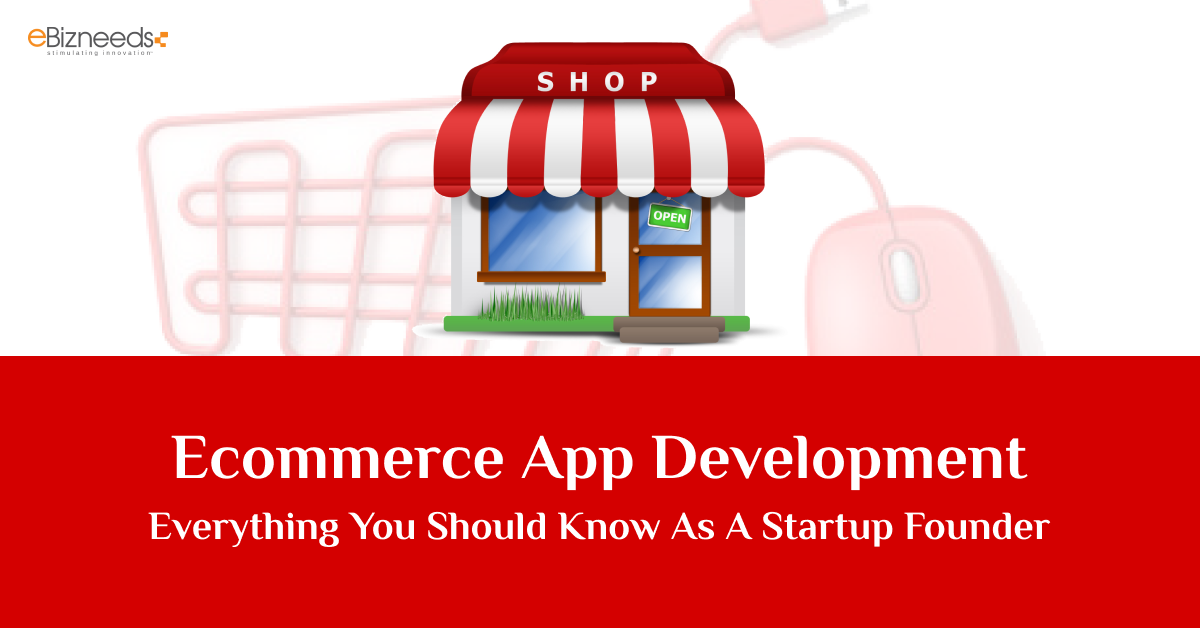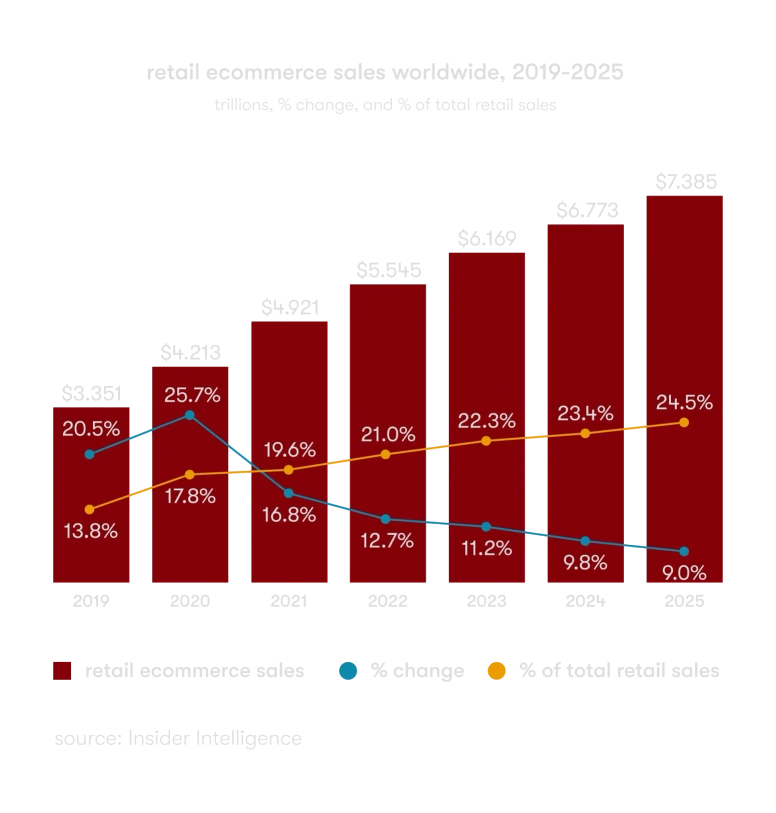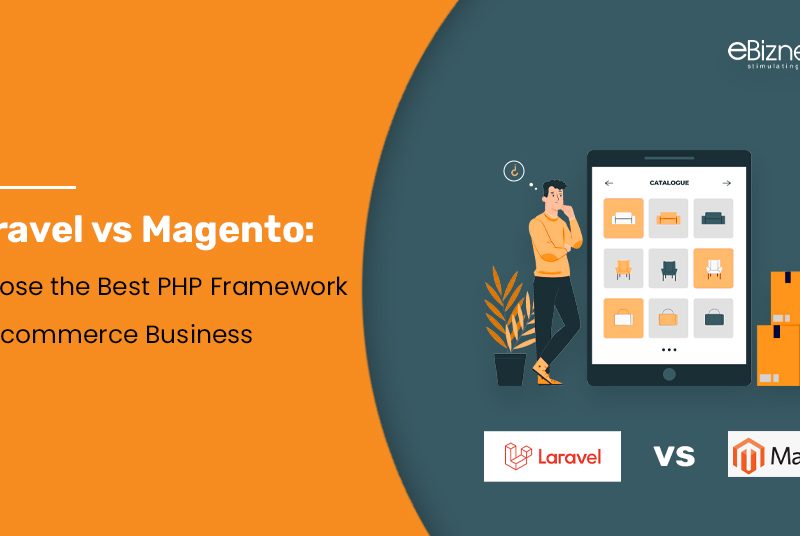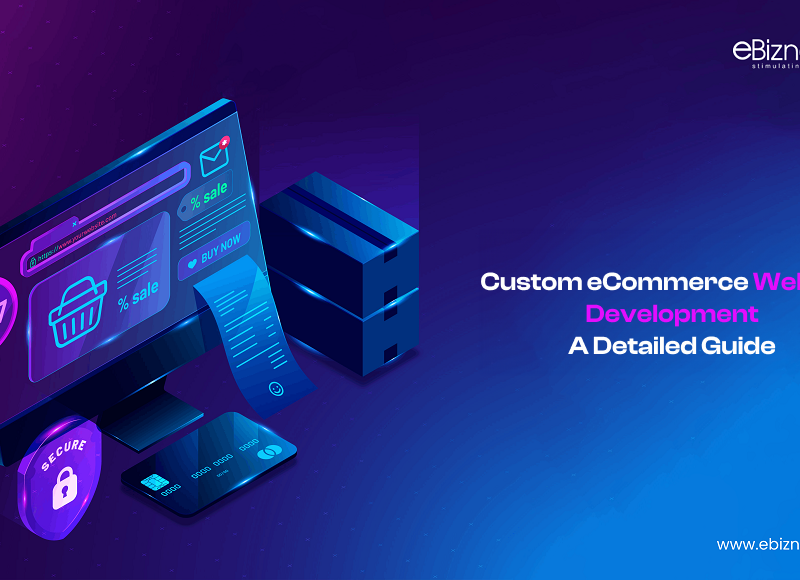Last updated on September 4th, 2024 at 01:32 pm
In the modern era of commerce, the increase of smartphones and the internet has guided in a new era of business – one dominated by e-commerce. For start-up founders venturing into the digital realm, developing a robust e-commerce app is not just a choice; it’s a strategic imperative. This extreme shift in consumer behavior demands an understanding of the difficulties involved in creating a successful e-commerce app, as it becomes the virtual path to your business. However, going through the journey of ecommerce app development is similar to guiding a busy marketplace, full of technological concerns, customer experience differences, and market trends.
From choosing the right ecommerce app development company and payment gateways to building an amazing user interface that exceeds devices, the decisions made at this point can define the future of your business. As a start-up founder, the ability to comprehend the essentials of ecommerce app development is paramount, as it empowers you to transform ideas into a seamless, user-centric digital store.
This guide is designed to equip you with the knowledge needed to tackle this transformative journey, offering insights into the key components, best practices, and emerging trends that will not only streamline the development process but also position your ecommerce venture for success in an ever-evolving digital marketplace.
What is an Ecommerce app?
An ecommerce app is a specialized application designed to enable online transactions and streamline the process of buying and selling goods or services over the Internet. However, serving as a virtual marketplace accessible through smartphones or other mobile devices, these apps have become vital components of modern retail ecosystems. Ecommerce apps provide a platform for businesses to showcase their products. Thus, allowing users to browse, compare, and make purchases conveniently from the comfort of their devices.
These applications encompass a range of features, including secure payment gateways, product catalogs, user accounts, and order tracking mechanisms. User-friendly interfaces and personalized experiences are key aspects, enhancing the overall shopping journey for consumers. Additionally, e-commerce apps often leverage advanced technologies such as artificial intelligence and machine learning to analyze user preferences, offer personalized guidance, and optimize the overall shopping experience.
For businesses, an ecommerce app is not just a digital store but a strategic tool to expand their reach, engage with customers, and capitalize on the global marketplace. The growth of ecommerce apps images the shift in consumer behavior towards digital transactions, making them crucial for businesses seeking to succeed in the digital age.
Ecommerce App Development – A Complete Market Overview
The market for ecommerce app development is flourishing, filled with the ever-growing importance of online commerce and the increasing support of digital platforms for shopping. As consumers continue to adopt the convenience of ecommerce, businesses are keen to capitalize on this trend by investing in strong, user-friendly applications. So, here’s a brief overview of the market dynamics in ecommerce mobile app development:
1. Growth Trajectory
The global ecommerce market is on a steady upward trajectory, driven by factors such as increasing internet penetration, smartphone usage, and a shift in consumer preferences toward online shopping. This growth has led ecommerce app development services business to recognize the need for feature-rich, scalable ecommerce applications.
2. Mobile Dominance
With the surge in mobile device usage, especially smartphones, ecommerce app development has become pivotal. Consumers prefer the ease and accessibility of shopping on mobile apps, prompting businesses to prioritize mobile-centric strategies in their ecommerce initiatives.
3. Technological Advancements
Ecommerce applications are leveraging the latest technologies to enhance user experiences. Features like augmented reality for virtual try-ons, AI-driven personalization, and seamless payment gateways are becoming standard. Finally, providing users with a more immersive and convenient shopping environment.
4. Customization and Scalability
Businesses are increasingly seeking customized ecommerce solutions that align with their specific needs. Scalability is also a critical factor as companies aim to house growing user bases and expand their offerings.
5. Competitive Landscape
The ecommerce app development space is competitive, with numerous platforms and development agencies offering solutions. Start-ups and established businesses alike are competing to create unique, innovative applications to stand out in a crowded market.
6. Security and Compliance
Because of the sensitive nature of financial transactions, security is a paramount concern in ecommerce app development. Sticking to data protection regulations and the use of strong security measures are non-negotiable for gaining user trust.
Ecommerce App Development – Why Should You Consider?
Considering ecommerce mobile app development company is not just about staying technologically relevant. It is a strategic move to align with consumer preferences, expand market reach, and build a resilient and future-ready business in the digital era. So, let us discuss the reasons to develop an ecommerce app.
1. Global Market Reach
Ecommerce app development opens the door to a vast, global marketplace. By creating a digital storefront, your business transcends geographical boundaries, allowing you to reach and engage customers around the world. This expanded reach can significantly boost sales and brand visibility.
2. Changing Consumer Behavior
The shift towards online shopping is undeniable. With the convenience of smartphones and high-speed internet, consumers prefer the ease of browsing and making purchases through dedicated ecommerce apps. Moreover, adapting to this trend ensures that your business stays relevant and accessible to a tech-savvy audience.
3. Enhanced User Experience
E-commerce apps provide a personalized and streamlined shopping experience. Tailored product recommendations, easy navigation, and secure, one-click payment options contribute to a user-friendly interface. A positive user experience not only encourages repeat business but also fosters customer loyalty.
4. 24/7 Availability
Unlike physical stores with set operating hours, ecommerce apps are open 24/7. This continuous availability caters to the diverse schedules of consumers worldwide. Whether it’s early morning or late at night, customers can browse products and make purchases at their convenience, fostering flexibility in shopping.
5. Data-Driven Insights
Ecommerce apps generate valuable data on customer behavior, preferences, and buying patterns. Analyzing this data provides insights into market trends, allowing businesses to make informed decisions, optimize their offerings, and implement targeted marketing strategies for better engagement.
6. Competitive Advantage
Having a well-designed ecommerce app gives your business a competitive edge. As consumers increasingly turn to online shopping, not having a dedicated app can put you at a disadvantage compared to competitors who offer a more seamless and accessible digital experience.
7. Scalability and Flexibility
Ecommerce apps are scalable, allowing your business to adapt and grow without significant infrastructure changes. As your product catalog expands or user traffic increases, the app can be easily updated to accommodate these changes, ensuring a smooth and efficient operation.
8. Direct Customer Engagement
Ecommerce apps provide a direct channel for communication with customers. Through push notifications, personalized offers, and in-app messaging, businesses can engage with users. Moreover, they can build relationships and create a sense of community, fostering brand loyalty.
9. Brand Visibility and Recognition
Having an ecommerce app increases your brand’s visibility. Users often browse app marketplaces, and having your app listed there can attract new customers. Additionally, a well-designed app contributes to brand recognition and reinforces your business identity.
10. Adaptation to Market Trends
Ecommerce apps allow businesses to stay agile and adapt to emerging market trends quickly. Whether it’s incorporating new technologies, responding to consumer demands, or aligning with industry shifts, a digital platform provides the flexibility needed to thrive in a dynamic market.
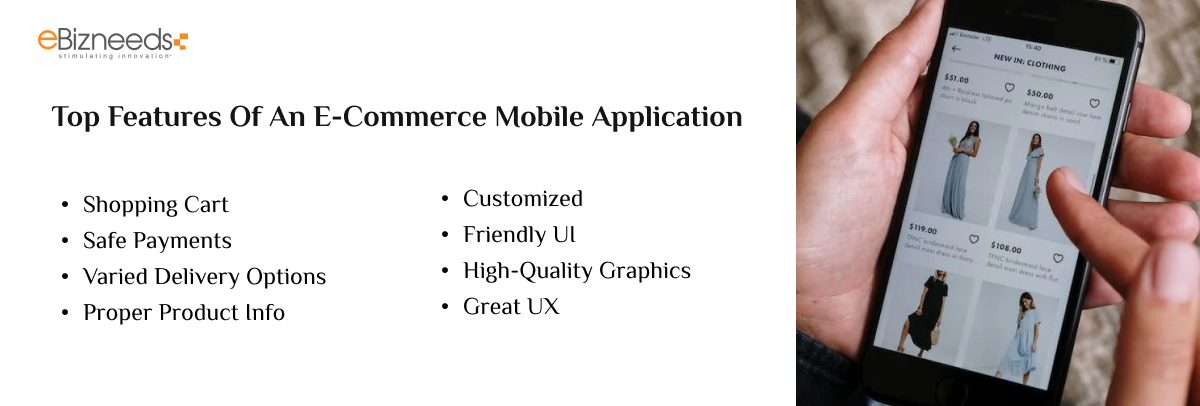


Read Also: eCommerce Payment Gateway – Types, Example and How It Works
Ecommerce App Development – Know the Top Types
There are several types of ecommerce applications you can develop, depending upon the business niche. Hence, below we will describe those types below.
1. B2C Ecommerce Apps
Business-to-Consumer (B2C) ecommerce apps are the cornerstone of online retail, connecting businesses directly with end-users. These apps focus on providing a seamless and personalized shopping experience, often incorporating features like product recommendations, user reviews, and secure payment gateways. B2C apps cover a wide range of industries, from fashion and electronics to groceries and entertainment.
The key goal is to engage individual consumers, offering them a convenient platform to explore products, make purchases, and track orders. Examples such as Amazon and Shopify showcase the diversity and significance of B2C ecommerce apps in catering to the evolving needs and preferences of today’s digitally savvy consumers.
2. B2B E-commerce Apps:
Business-to-business (B2B) ecommerce apps play a pivotal role in facilitating transactions between businesses. Unlike B2C apps, these platforms are designed to meet the unique needs of enterprises involved in wholesale or bulk purchasing. B2B e-commerce apps streamline complex procurement processes, allowing businesses to place large orders, negotiate pricing, and manage inventory efficiently.
These apps often incorporate features like account management, customized pricing structures, and integration with enterprise resource planning (ERP) systems. Notable examples include Alibaba and ThomasNet, highlighting the importance of B2B ecommerce apps in fostering seamless collaboration and trade among businesses on a global scale.
3. C2C Ecommerce Apps
Consumer-to-consumer (C2C) ecommerce apps act as platforms where individual users can buy and sell directly to one another. These apps create virtual marketplaces, allowing individuals to list their products or services for sale.
Popularized by the concept of peer-to-peer transactions, C2C ecommerce apps often include features like user ratings, secure payment systems, and communication tools to facilitate transactions. Notable examples include platforms like eBay and Poshmark, showcasing the power of connecting consumers for second-hand or unique item exchanges.
4. M-Commerce Apps
Mobile Commerce (M-Commerce) apps are tailored for mobile devices, emphasizing the growing trend of shopping on smartphones and tablets. These apps ensure a seamless and responsive user experience on smaller screens, with features like mobile wallets, QR code scanning, and location-based services. M-commerce apps are versatile, covering various B2C and C2C models, and are essential for businesses looking to tap into the widespread use of mobile devices for online transactions.
5. Social Commerce Apps
Social Commerce apps integrate ecommerce functionalities within social media platforms. Hence, these apps leverage the social aspect of online interactions, allowing users to discover and purchase products directly within their favorite social networks.
Integration of social features, such as user reviews, likes, and shares, enhances the shopping experience. Examples like Instagram Shopping and Facebook Marketplace demonstrate the fusion of social engagement and online shopping, creating a dynamic and interactive shopping environment.
What Are The Latest Ecommerce App Development Trends?
1. Progressive Web Apps (PWAs)
Progressive Web Apps (PWAs) are gaining prominence as a cost-effective and efficient alternative to traditional native apps. They offer a seamless user experience by combining the best features of web and mobile applications.
PWAs are characterized by fast loading times, offline functionality, and responsive designs, ensuring users can engage with the app even in low-network conditions. Therefore, with major brands adopting PWAs, this trend emphasizes the importance of accessibility and user experience across various devices and network scenarios.
2. Voice Commerce
Voice commerce is revolutionizing the way users interact with ecommerce apps. The integration of voice-activated devices, such as smart speakers and virtual assistants, allows users to search for products, add items to their carts, and complete transactions using voice commands.
This trend not only enhances user convenience but also opens new avenues for businesses to create seamless, hands-free shopping experiences. As natural language processing and voice recognition technologies advance, voice commerce is expected to play a more significant role in shaping the future of ecommerce interactions.
3. Augmented Reality (AR) and Virtual Reality (VR)
The use of Augmented Reality (AR) and Virtual Reality (VR) in ecommerce apps is creating immersive and interactive shopping experiences. AR enables users to visualize products in their real-world environment before making a purchase, enhancing confidence and reducing return rates.
On the other hand, VR is transforming online shopping by offering virtual storefronts and engaging environments where users can explore products. These technologies are not only enhancing the user experience but also providing innovative solutions for marketing and product presentation.
4. AI and Machine Learning
Artificial Intelligence (AI) and Machine Learning (ML) are at the forefront of ecommerce app development, powering personalized experiences and improving operational efficiency. AI algorithms analyze user behavior, predict preferences, and offer tailored product recommendations, creating a more engaging shopping journey.
Machine Learning is also being utilized for demand forecasting, inventory management, and fraud detection, optimizing various aspects of the ecommerce business. As these technologies continue to evolve, e-commerce apps are becoming more adaptive and capable of delivering dynamic, personalized interactions to users.
5. Chatbots and Conversational Commerce
The integration of Chatbots and conversational interfaces in ecommerce apps is transforming customer support and engagement. Chatbots powered by AI handle customer queries, provide product information, and assist in the purchasing process.
Conversational commerce allows users to complete transactions and gather information through chat interfaces, creating a more interactive and user-friendly shopping experience. This trend not only enhances customer service but also streamlines the user journey, making it more convenient and efficient.
6. Contactless Payments
Contactless payments have become a focal point in ecommerce app development, especially in response to the increased emphasis on hygiene and convenience. Mobile wallets, NFC technology, and other contactless payment options are being integrated into ecommerce apps to provide users with secure and efficient ways to make transactions. This trend reflects the industry’s commitment to staying ahead of evolving payment preferences and ensuring a seamless and secure checkout process for customers.
7. Subscription-Based Models
Subscription-based models are reshaping how consumers access products and services. Ecommerce apps are incorporating subscription features, allowing users to subscribe to products regularly. This trend fosters customer loyalty, ensures a predictable revenue stream for businesses, and encourages a more sustainable consumption pattern. From beauty products to meal kits, the subscription model is diversifying across industries, offering users a convenient and personalized way to access their favorite products.
8. Sustainability and Ethical Shopping
Sustainability and ethical considerations are increasingly influencing consumer choices. E-commerce apps are responding by highlighting eco-friendly and ethically sourced products. Some apps go beyond mere product listings by providing transparent information about the supply chain, environmental impact, and ethical practices of the brands they feature. This trend reflects a growing awareness among consumers who seek products that align with their values, pushing ecommerce platforms to contribute to a more sustainable and ethical marketplace.
9. Social Commerce Integration
Social commerce is blurring the lines between social media and e-commerce. Ecommerce apps are integrating with popular social media platforms to enable users to discover, share, and purchase products seamlessly within the social environment.
Features like in-app shopping, live streaming events, and user-generated content contribute to a more engaging and interactive shopping experience. Social commerce not only leverages the social influence of users but also provides businesses with new avenues for marketing and brand promotion.
10. Blockchain for Security
Blockchain technology is gaining traction in ecommerce app development, particularly for enhancing security and transparency. It ensures secure and tamper-proof transactions by creating a decentralized and distributed ledger.
In ecommerce, this technology is utilized to enhance supply chain visibility, authenticate product origins, and secure online transactions. The emphasis on blockchain reflects the industry’s commitment to addressing security concerns, preventing fraud, and building trust among users in an increasingly interconnected digital marketplace.
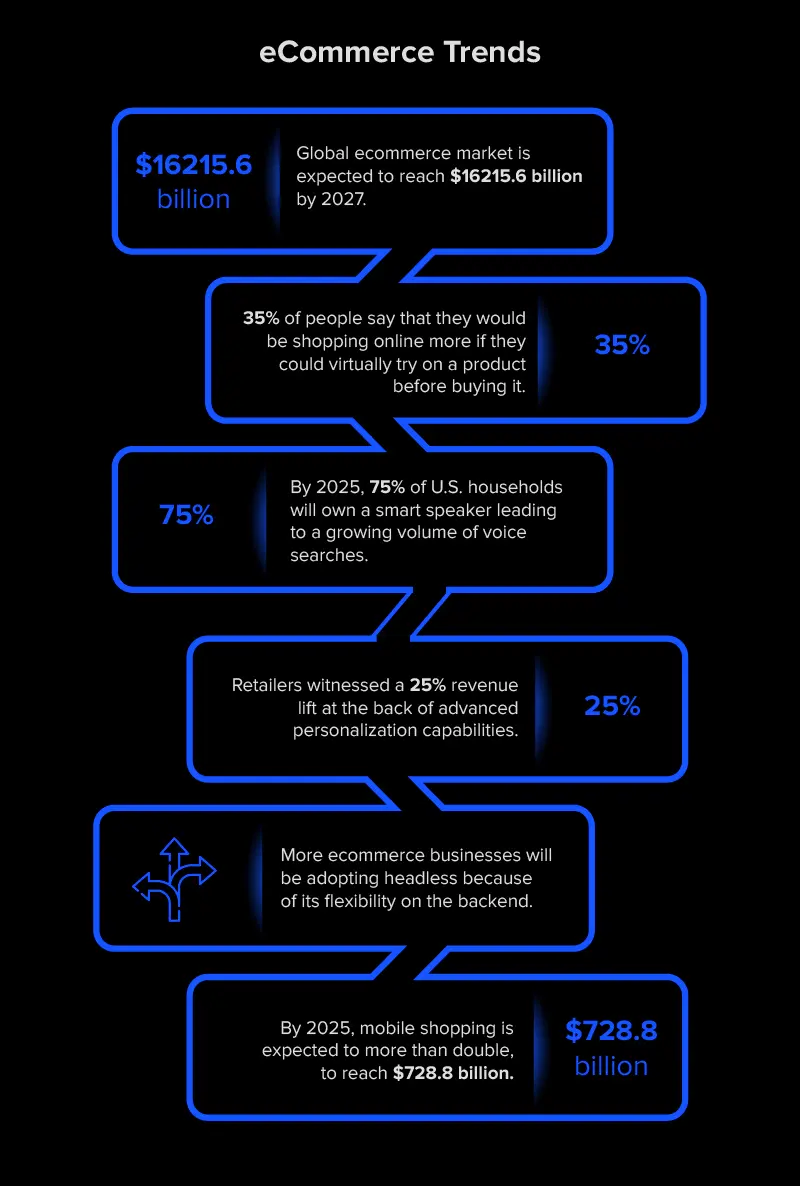


Read Also: Types, Cost and Monetization Strategies of eCommerce App
Ecommerce App Development – Easy Steps of How To Build It
Building an e-commerce app involves several steps to ensure a seamless and functional end product. Here’s a simplified guide to help you navigate the process of Ecommerce App Development:
1. Define Your Goals and Target Audience
Clearly outline the objectives of your e-commerce app. Identify your target audience, their preferences, and the unique selling points that will set your app apart in the market.
2. Market Research
Conduct thorough market research to understand industry trends, competitor strategies, and user expectations. Analyze successful e-commerce apps to gather insights into design, features, and user experience. Consider Enterprise App Development Services for better understanding and support.
3. Choose the Right E-commerce Platform
Select a suitable e-commerce platform based on your business needs. Popular options include Shopify, WooCommerce, Magento, and custom solutions. Consider factors like scalability, customization options, and ease of integration.
4. Design the User Interface (UI)
Create an intuitive and visually appealing UI. Prioritize a user-friendly layout, easy navigation, and a seamless shopping experience. Ensure responsive design to accommodate users on various devices.
5. Select Appropriate Features
Choose essential features for your ecommerce app, such as product catalog, shopping cart, secure checkout, user accounts, and payment gateways. Additional features like push notifications, reviews, and social media integration can enhance user engagement.
6. Integrate Secure Payment Options
Implement secure and convenient payment gateways. Offer a variety of payment options, including credit/debit cards, digital wallets, and other popular methods. Ensure compliance with industry standards for secure transactions.
7. Develop the App
Collaborate with experienced developers or a development team to build your ecommerce app. Whether you choose native development or cross-platform solutions, ensure the app is robust, scalable, and compatible with both Android and iOS platforms.
8. Implement Security Measures
Prioritize security to protect user data and transactions. Use encryption protocols, and secure sockets layer (SSL) certificates, and ensure compliance with data protection regulations. Regularly update the app to patch security vulnerabilities.
9. Testing & Launch
Conduct thorough testing to identify and resolve any bugs or issues. Perform usability testing to ensure a smooth user experience. Test the app on different devices and operating systems to guarantee compatibility. Launch your e-commerce app on the App Store and Google Play.
10. Provide Ongoing Support
Offer reliable customer support to address user queries and concerns. Regularly update the app to introduce new features, improve security, and stay ahead of technological advancements.
Read Also: A Complete Guide to Custom eCommerce Website Development
How Much Does It Cost To Develop An Ecommerce Application?
If you’re thinking of building an online store, you might be wondering how much it will cost. The answer depends on various factors like how complicated you want your store to be, how you want it to look, and whether you want it to work on computers or smartphones. It also depends on how much the people building it will charge.
For a basic online store that lets people sign up, browse your products, add items to a shopping cart, pay for their purchases, and have them delivered, you can expect to spend anywhere between $5,000 to $50,000.
If you want to create a basic ecommerce app, it may cost you around $10,000. However, if you want to add more advanced features like customized recommendations, integration with social media, support for multiple vendors, and a lot of customization options, then the cost can go beyond $100,000.
Additionally, you also need to consider the ongoing maintenance and scalability of the app, which can add to the overall cost. It’s important to work with a reliable development team for building an ecommerce app with the best tech stack. You must discuss your needs and budget accurately to ensure that your ecommerce app is delivered successfully within your budget.
Essential Features For The E Commerce App MVP
When creating the first version of an online minimum viable product store app, it’s important to make sure that it includes the most important features for a good shopping experience. At the same time, it should also have all the necessary functions to allow customers to make purchases with ease. Here are some of the key features that should be included:
User Profile
Users should be able to create their own accounts and keep track of their personal information, such as their order history, preferences, and addresses. This makes it easier to personalize their experience and makes future purchases simpler.
Filter
When you are looking for something online, it can be overwhelming to go through all the options available. To make things easier, many websites have filters with better UI UX design that let you narrow down your search results based on what you’re looking for.
Filters allow you to choose specific criteria like price range, brand, size, color, and more, in order to see only the items that match your preferences. This can save you a lot of time and effort, and help you find the products you want quickly.
Search
Make sure your website has a good search bar that helps people find what they’re looking for quickly and easily. This can be done by adding features like suggestions, spell-checking, and autocomplete. These tools can really improve the search experience for your users and improve your ecommerce business.
Checkout Process
Create a simple and easy-to-use system that helps customers buy things from your online store. The system should guide them through the process of adding items to their cart, reviewing what they’ve added, entering their shipping and billing information, choosing how they want their items to be shipped, and finally, confirming their purchase.
Authorization
It’s important to have a way to make sure that only the right people can access certain parts of a website or app, like your personal account information or when you’re making a purchase. This helps keep your information safe and makes sure no one else can use your account without your permission.
Payment System
Make sure that your website or app has a secure and easy way for customers to pay. This should include different payment options like credit/debit cards, digital wallets, and other popular payment methods. By doing this, you can build trust with your customers and increase the likelihood of them making a purchase.
To make your customer hopping experience better, there are some important things that an e-commerce app should have. These features help make the app easier to use and more reliable. By including them in the app, you can give users a good starting point for shopping online. This way, you can focus on providing value and making the app work well, while users can enjoy a seamless shopping experience.
Final Words
Moving further, launching an ecommerce app is not the end but a new beginning of an ongoing process. Continuous monitoring, optimization, and updating with technological advancement are essential for maintaining a competitive edge. You will get long-term success of your ecommerce venture by providing secure transactions, innovative features, and a seamless user experience.
As you navigate the difficulties of ecommerce app development, remember the building a successful platform is a dynamic and innovative process with the help of Custom Software Development Services. By aligning your app with user expectations, your business objectives, and industry trends, you can create a digital storefront that exceed customer expectations in modern world of online commerce.
FAQ of Ecommerce App Development
For developing an e-commerce application, eBizneeds charges start from $15 (USD) per hour to $45000 (USD) for an entire development project. The exact amount depends on the complexity and features included in the application and other requirements of the clients.
The time to develop an e-commerce application varies from 8 weeks to 12 weeks. However, the actual time depends upon the requirements of the project and other unique services involved.
The project begins with selecting a platform and a programming language for building the backend and frontend components. Rest, you need to consider tools and libraries, software ecosystem, designing UX & UI, API integration, and other vital implements. If you are not an expert developer, consider hiring a commerce app development company for an easy process.
Developing an e-commerce app for small businesses enhances accessibility, provides a direct channel for sales, and increases customer engagement. It enhances brand loyalty, allows personalized interactions, and opens new revenue streams. With a mobile presence, small businesses can tap into a broader market and compete effectively.



Naveen Khanna is the CEO of eBizneeds, a company renowned for its bespoke web and mobile app development. By delivering high-end modern solutions all over the globe, Naveen takes pleasure in sharing his rich experiences and views on emerging technological trends. He has worked in many domains, from education, entertainment, banking, manufacturing, healthcare, and real estate, sharing rich experience in delivering innovative solutions.
